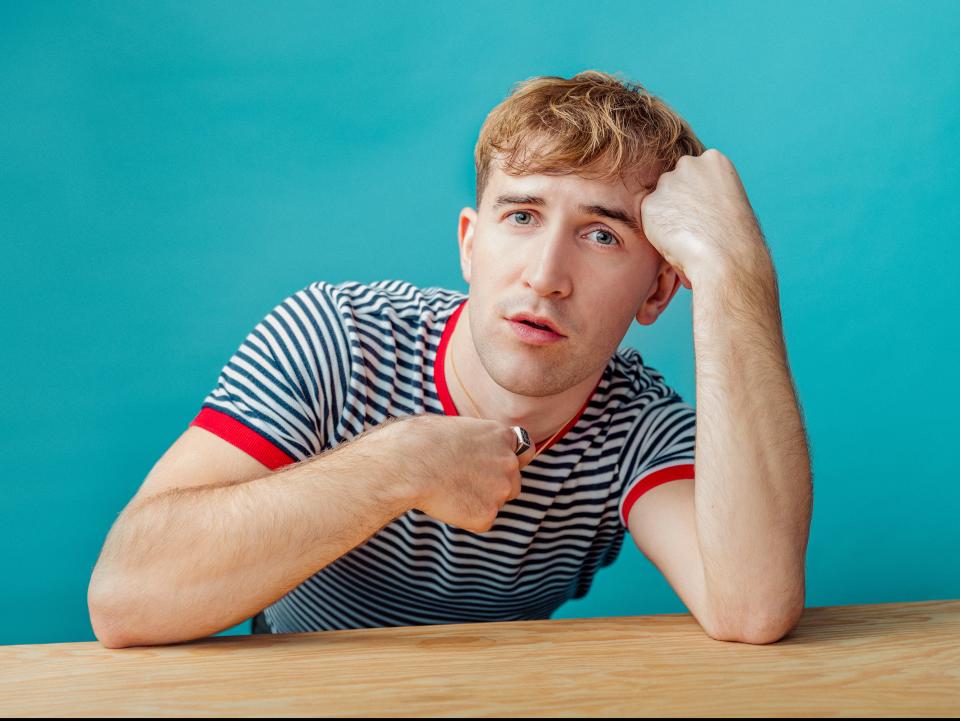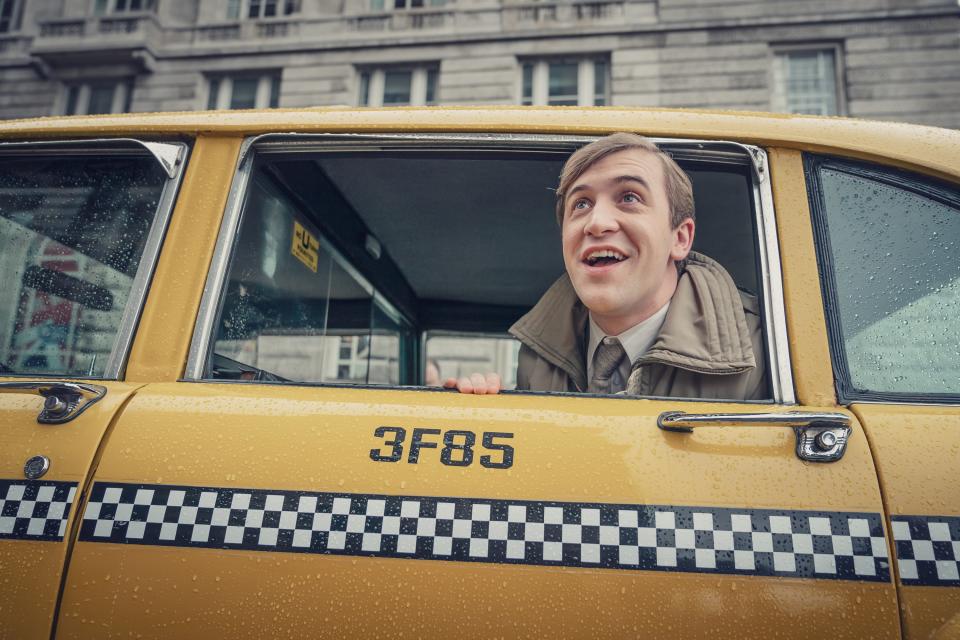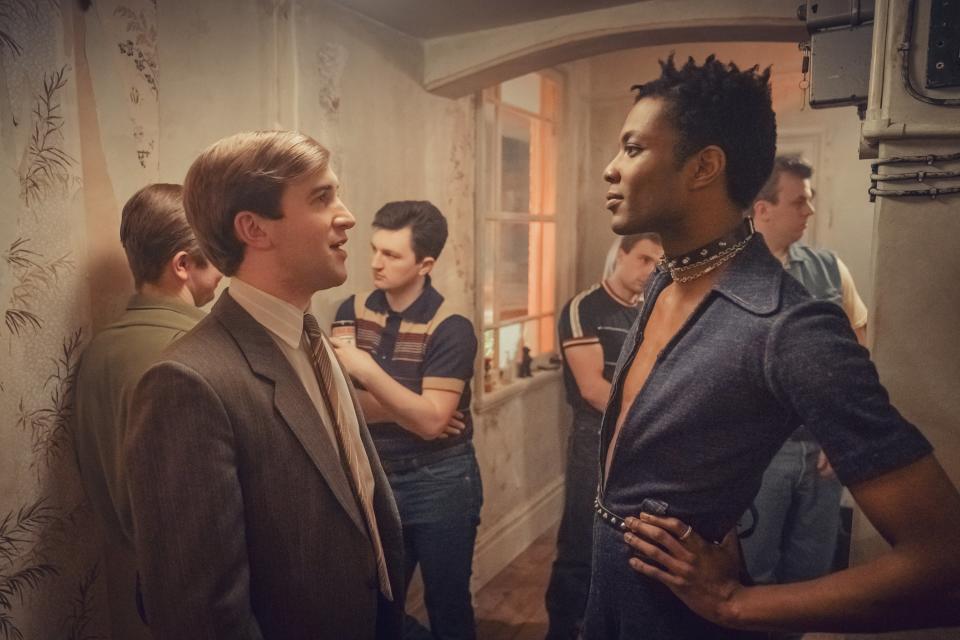It’s a Sin star Callum Scott Howells: ‘People deny that Covid-19 is real? My grandparents are dead from it’

This article contains major spoilers for ‘It’s a Sin’
A young man convulses on the floor of a printing shop. “Freedom” by Wham! blasts out of the speakers. The printer churns out page after page. And Colin lies gasping for breath as spasms ricochet through his body. It’s the first sign that anything is wrong, and a while later, he is diagnosed with Aids.
The character’s grim deterioration in episode three of It’s a Sin is as distressing a scenario as you’ll ever see in a television drama. Colin suffers from hallucinations and strokes; after his diagnosis, he’s deemed a “public menace” and locked away in an empty hospital room. At the peak of Colin's illness, he develops dementia, causing him to lose his inhibitions. In one harrowing scene, he masturbates, glassy-eyed, about a friend who has come to visit. By the end of the episode, Colin is dead.
Callum Scott Howells, the 21-year-old who plays Colin, knows what it’s like to lose someone to a cruel disease. Covid has claimed the lives of two of his grandparents, and his Twitter feed is full of condemnations of the protesters outside UK hospitals claiming the virus is a hoax. “I'm fighting for my grandparents,” he says. “They were the biggest part of my life. People deny that Covid-19 is real? I can tell you it is real because my grandparents are dead. Sorry, I know that's really brutal. I'm sorry if you find this too direct.”
It is striking how many of the issues faced by the British public in Russell T Davies’s new drama, set during the Aids crisis in the Eighties, are so prevalent in 2021. It’s a Sin addresses misinformation, conspiracy theories, fear, blame culture, and the government’s slow and flawed response to a fast-spreading disease. “It has frightening parallels with today’s world,” agrees Howells. “I remember sitting in the make-up truck on set and being like, ‘Oh, there's this thing called coronavirus and people are saying it's going to come over here.’ And you just hope it will disappear. Fast forward to now and we're on Zoom and we can't meet in person because of this pandemic. It's similar to the Aids crisis in the sense that people didn’t think it was real. And as soon as it hits you just go, ‘F***.’”
While the thought of fits and deadly illness makes the show sound unbearably bleak, it isn’t. At least not relentlessly so. It’s also joyous. And that’s what makes it so powerful. Critics have hailed the drama as a “poignant masterpiece” that is “devastating” and “uplifting” in equal measure. The Independent’s Ed Cumming wrote that it reminds us that “a terrifying disease is all the more reason to find joy where you can”. Graham Norton called it “the best five hours of television I’ve seen in years”, and HIV-positive men who lived through the Eighties have flocked to Twitter to say that it wasn't just an emotional watch, it was like reliving the darkest times of their lives.

Based on Davies’s own experiences, and written in honour of all the friends the writer lost, It’s a Sin pulsates with synth pop, disco beats and the giddy, carefree optimism of youth. It centres on a group of 18-year-olds who meet in London in 1981. Colin, along with Ritchie (Olly Alexander), Roscoe (Omari Douglas) and Jill (Lydia West), live in a flat they call the Pink Palace. They greet each other by singing “La!” in sequence and spend their weekends grinding up against boys in Heaven. They laugh off scaremongering headlines about a mysterious new disease dubbed the “gay cancer”. “What does it look like, is it pink?” asks Ritchie. “Where is it? Is it in the wrist? I mean, for God’s sake.” But we know something they don’t. And it’s not long before HIV creeps into their bloodstreams.
Colin, who looks like a young Alan Partridge with his blonde side-parting and gormless expression, is the sweetest and squarest of the lot. He moves to London from a small town in Wales and finds a mentor in Henry (Neil Patrick Harris), an older gay colleague at the tailor’s shop where he works. Howells, who identifies as queer, has a lot in common with Colin. He grew up in a village in the Rhondda Valley in south Wales, where he was raised by his mother, an NHS worker, and his father, who delivers pies and pasties. “I can completely relate to Colin,” he tells me over Zoom from his parents’ house in Tonyrefail. “He comes from a place where he's struggled to be himself. It’s not easy to grow up in the Valleys as a queer person. It’s really difficult. There aren't many of us. Then he goes to London and absorbs all these amazing experiences. I totally get it. I know exactly what that’s like.”
Despite the seriousness of parts of our conversation, Howells is radiant company. He has a habit of cartoonishly pulling his hands down his cheeks whenever he hears a compliment or remembers he's earning a living as an actor. His parents first knew he liked performing when he belted out songs on long car journeys as a child. They put him in an amateur dramatics class, which he attended for seven years, and then he was spotted by an agent aged 16 when he starred in a revival of the musical She Loves Me. After that, Howells trained formally at the Royal Welsh College of Music and Drama and was part-way through his studies when It’s a Sin popped up.
Reading the script, says Howells with typical exuberance, was “like tasting a Galaxy chocolate bar for the first time”. He found out he’d got the part while he was visiting his old comprehensive in Treorchy. “I like going back because school was such a laugh and I have a good relationship with the teachers there,” he says. “My agent called and said, ‘Hey, Callum, are you sitting down?’ And I said, ‘No, but tell me anyway.’ And he said, ‘You're not going to believe it, but this is the offer.’ It was mad, I went straight home and hugged my mother. And all my teachers were like, ‘Aw fantastic, we're so proud,’ but no one really knew what it was at the time.”
When Howells took on the role, he had very little knowledge of the Aids crisis. “For some reason I didn't get taught anything about it at school,” he says. “I had only heard about it from films like Pride and Philadelphia. You watch these things and go, ‘So wait, what is this?’ I had to really dig for stuff. It wasn't until I read the scripts that I understood the true horrors of not just the disease but the way the country dealt with it.”

Howells doesn’t just know a lot about the Aids crisis now – he is angry about it. He points to Margaret Thatcher’s highly controversial Section 28 legislation, which banned discussion of same-sex relationships in schools. In a 1987 speech, Thatcher had said: "Children who need to be taught to respect traditional moral values are being taught that they have an inalienable right to be gay. All of those children are being cheated of a sound start in life. Yes, cheated." Howells calls this “absolutely awful propaganda” that was “fuelled by hate”. “We’re still suffering the consequences of it today,” he says.
Learning about the epidemic from Russell T Davies was a privilege, says Howells. Before filming, the cast and creators had a week together to discuss the characters and share stories about themselves. “The most important part of that was every time Russell opened his mouth,” says Howells. “We were all just in awe. We couldn't believe how brave he was. He'd talk about the real people that inspired the show. The fact that even to this day, some of their families still deny the fact that their children died of Aids. To me, that's unbelievable. The shame that's embedded throughout the generations – it's just tragic. I can't help but feel emotional when I think about it.”
Howells is hopeful that people who watch It’s a Sin and see the myths surrounding the Aids crisis being debunked will start to understand the current pandemic better. He is clearly very politically engaged. When we speak, it’s the day after the Capitol was stormed by pro-Trump rioters. “I'm really scared about the next 10 years for humanity,” he says. “To say democracy is under attack is an understatement. We are living in a time that is apocalyptic, like one big Black Mirror or Years and Years episode. It doesn’t feel like reality any more.”
Does he want to star in more political dramas? “I'd love that,” he says. “But also, I'm grateful just to work. Being able to play important characters is just a privilege.” He puts his head in his hands and pulls down on the bottom of his eyes with his fingers, and the summery side of him comes out again. “I can't thank people enough for believing in me and hiring me,” he says. “Hahaha! Wow.”
It’s a Sin is available as a boxset now on All4. Episodes also air on Channel 4 on Friday nights at 9pm
Read More
It’s a Sin is a reminder to find joy in the scariest times
Russell T Davies’s best shows ranked, from Doctor Who to Queer as Folk

